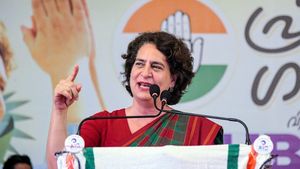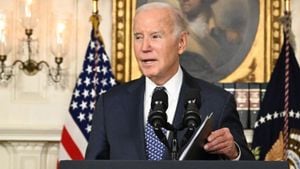Donald Trump's recent election victory has stirred significant buzz across various sectors, particularly in the realms of banking and global markets. Analysts are pondering the potential ripple effects of his administration's policies as investors brace themselves for shifts.
According to Gerard Cassidy, managing director at RBC Capital Markets, Trump's presidency is expected to scale back regulations in the banking industry, thereby creating favorable conditions for consolidation. During his previous term, Cassidy noted, regulatory leeway was granted to major banks, making deals easier to navigate. "Under the Biden administration, regulation has been dialed up, it's more onerous, particularly at the U.S. Consumer Financial Protection Bureau (CFPB)," he explained. This shift could reverse, benefiting banks eager to combine forces.
One of the pivotal factors driving this prediction is the CFPB's scrutiny over fees charged by lenders on late credit card payments—a significant revenue stream for banks. Cassidy anticipates this regulatory pressure may be lifted, allowing banks to maintain the fees they currently charge. The consistency of support for banks from the regulators during Trump's first presidency is another point Cassidy raises as one of the reasons for optimism under Trump's reign.
Yet, the consolidation of banks is not new. Cassidy points out this trend has been evident for over 40 years and is heavily influenced by the economic environment and regulatory frameworks currently at play. "It goes in waves; peaks and troughs," he remarked. While currently, there is uncertainty, especially with interest rates climbing, Cassidy believes conditions for mergers and acquisitions could soon improve.
He also highlights the vast number of regional banks across the U.S. actively seeking growth through potential mergers. Major banks like JPMorgan Chase and Bank of America, constrained by regulatory approval processes due to their market share exceeding 10%, will not be able to partake. For these smaller institutions, the window for strategic acquisition could become more viable if regulations lighten.
Meanwhile, the response from global investors is reflective of these developments. Strategists at Bank of America (BofA) are urging investors to shift their focus toward international stocks. Their advice centers around countries like China and various nations within Europe, posing these markets as attractive options prior to Trump’s inauguration. "Buy international stocks—China, Europe—before inauguration day," suggested Michael Hartnett, leading BofA's team of strategists.
Despite the recent rush to U.S. assets following Trump's electoral win, BofA's note emphasizes bearish sentiments toward foreign markets are approaching levels worthy of contrarian buying. Stocks from Europe and China have significantly lagged behind the S&P 500—up 25% this year—while European indices barely scraped together gains of about 5%. This underperformance may indicate ripe opportunity for those daring enough to venture outside U.S. borders.
The past week's market activity highlights this trend, with over $55 billion flowing toward U.S. stocks. Conversely, there's been around $10 billion leaving European and other developing markets. What this shows is a clear preference for U.S. equities bolstered by optimism surrounding Trump's pro-business policies. But it seems the tides might be ready to change.
BofA strategists believe forthcoming shifts—like lower borrowing costs, depreciated currencies, and plummeting oil prices—will ease financial conditions particularly within Europe and China, thereby presenting viable investment opportunities. They also predict the financial climate is poised for tightening within the U.S. before Trump's inauguration, potentially signaling traders to adjust their strategies.
Hartnett’s recommendations extend beyond just international stocks. He also suggests keeping an eye on U.S. Treasuries, especially if yields rise to around 5%. Both gold and cryptocurrencies, as acknowledged by BofA's analysis, remain steadfast alternatives for inflation hedging. Notably, crypto has seen substantial investment lately, catalyzed by Trump’s vocal support for digital currencies during his campaign, with $6 billion surging back to the sector.
The fluctuations within markets and banking systems echo larger themes concerning the potential impacts of leadership changes on economic frameworks. While the immediate reactions from investors are often driven by emotion and speculation, those with foresight might capitalize on the upcoming policy changes fueling the waves of the financial markets.
Analysts across Wall Street are similarly examining the broader market reactions to Trump's anticipated policies. His administration is likely to implement tariff plans aiming at bolstering domestic production, which could have cascading effects on international trade. The anticipation of these moves has already induced shifts, and as the clock ticks down to his inauguration, songloads of speculation will continue to rise.
While Trump's first term experienced its fair share of financial volatility and unpredictability, the stakes for banks and investors alike seem particularly high this time around as the global economy grapples with the possibilities of renewed energy and revitalization stemming from deregulation.
Notably, as Cassidy forecasts increased flexibility for banks, it raises the question of whether this opportunity might lead to stability across the banking sector long term, or if it will merely intensify the cycles of merging and acquisition frenzy seen over the decades.
While some may argue deregulation could expose the economy to risks akin to pre-recession conditions, Cassidy maintains the banking system is well-capitalized, asserting, "The banking system is very healthy, very safe, and very strong." He alludes to recent failures, yet emphasizes the resilience of the system, crediting effective management of these challenges.
On the flip side, some market analysts remain cautious. The phrase “Trump Trade”—indicating strategic investment patterns driven by the expectations of his administration—continues to circulate. Many wonder how long it might last and what the potential fallout could be should reality diverge from expectations.
Overall, as investors refine their strategies eyeing potential profits or protecting against pitfalls, the economic scenery poised under Trump's election may yield significant lessons on the nature of market dynamics and regulatory constructs. With all eyes on the impending changes, financial experts urge prudence but also advocate for readiness to adapt as markets evolve.



